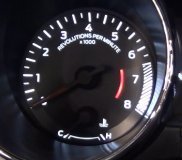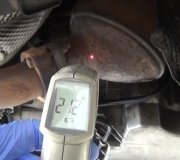I'm going to describe a series of symptoms -- these could be overlapping problems, but they have stumped the best experts, and I'm really anxious to find the problem - I'll also describe what was done to try to troubleshoot it. I have a 1987 Fiero V6 (~166K miles). I have two, but the 2nd one has an even more serious (but easy to fix problem), which I may ask another time.
1) When stopped, if I accelerate quickly, I have to ease off the gas or the car won't shift into the next gear. If I hold on the gas, the engine starts to resist accelerating even in that gear. This doesn't seem tied to a specific gear.
2) At exactly 42 MPH, there is a momentary loss of engine power. If I ease off the gas to just below this or accelerate to above it, this problem goes away.
3) When accelerating, there is a light knocking sound -- kind of like running your hand through a barrel of wooden dowels. I suspect this is the PCV valve banging up/down.
4) Finally the main problem: When I'm on the freeway if I reach a speed of exactly 78MPH, the engine will spontaneously start doing something which sounds/acts like engine-braking. Sometimes, the problem is intermittent between 61MPH and 78MPH, but 78MPH seems to really piss it off. There is a loss of power until the car reaches below 61MPH, then the problem stops. If you fight the power loss, you can hold the car at a specific speed, but the engine gets really loud. At this point, you might think "Vacuum leak" -- but keep reading: If you hold the engine at this specific speed for approximately 2 minutes straight, the engine warning light comes on (with code 44 - lean mixture). Here's the interesting part: While the warning light is on, all of the car problems go away completely -- even the acceleration problems and the knocking sound. The warning light will stay on until the car either drops below 61MPH or sometimes stays on until I'm stopped with the car in drive. If you really resist hard when the problem occurs at 78MPH, bringing the car to 82MPH, the problem also goes away (but without the warning light).
5) Also related to the above, sometimes if I am stopped with the car in drive, the warning light (code 44) will sometimes come on.
Here's what was done: I visually, and through feel, checked every plastic tube, metal pipe, rubber hose, and gasket for leaks. The top half of the engine above the head gasket was professionally (by Pontiac) removed and refurbished - they still think there is a vacuum leak, but are at a loss to explain why the problem goes away when an error code appears. And if it is a vacuum leak, I don't know where to look now. They also checked for exhaust leaks.
One website sugests all of the problem could be caused by a faulty IAC valve, however they go on to say this wouldn't explain the problems when the car isn't idling.
The problem seems to occur more frequently when the outdoor and/or engine temperatures are hot. And the problem, if it is tied in to something, seems like it may be occurring at specific RPMs -- maybe around 3600. So here's a possible scenario: When I'm accelerating, the shifting problem first occurs between first and 2nd -- around 3600RPM. Once I ease off, the transmission shifts, until I reach about 42MPH, which is around where it shifts from 2nd to 3rd - at about the same RPM. On the freeway, the place where the main problem is occurring is about at same RPM in 3rd, then because this is only a 3-speed transmission, there's no place to go at this point but higher RPMs.
6) Forgot to mention one more thing/symptom: Going into passing gear is almost a death sentence -- the car jumps to a high RPM (i.E. It switches properly), then immediately looses power/speed (Probably jumps down in speed by about 20MPH in about 4 seconds). If you hold it long enough, the car will come to an almost complete stop with the engine revving loudly.
Wednesday, July 18th, 2007 AT 7:04 AM


